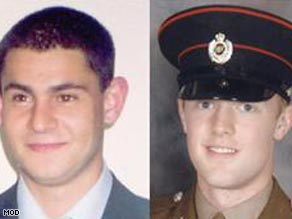
A police officer was killed in a shooting in Northern Ireland late Monday, just two days after two British troops were killed at a military base there, authorities said.
Police said the officer was shot in the head in Craigavon, a town southwest of Belfast. The victim and a fellow officer were responding in a police car to a call of unknown origin when the shooting occurred, police said. The second officer’s status was not immediately known. The incident followed the slayings Saturday of two British soldiers who were shot at a base in Massereene, in County Antrim, as they were preparing to ship out for duty in Afghanistan. The victims had already packed their bags, changed into desert uniforms and were awaiting a final pizza delivery, authorities said. “Some of them decided to order a final takeaway pizza before they departed,” Brigadier George Norton said from the base. Two masked gunmen with automatic rifles shot the soldiers as the pizzas arrived at the Army barracks, authorities said. Two other soldiers and the two pizza deliverymen were seriously wounded.
Don’t Miss
Terror returns to Northern Ireland
Anger over Northern Ireland ‘reconciliation’
How diplomacy brought peace to Northern Ireland
“They [the gunmen] continued firing at the men even when [soldiers were] injured, even when some had fallen to the ground,” Northern Ireland Secretary Shaun Woodward told parliament Monday, appealing to the public to come forward with information about the attack. “The firing lasted for more than thirty seconds — more than sixty shots were fired.” A militant splinter group, the Real IRA, reportedly claimed it had carried out the attack on the soldiers. Monday’s shooting at the working-class Craigavon neighborhood seemed to underscore mounting tensions there in recent months. The area is known to harbor dissidents, and it experienced rioting and raids last year as police hunted for suspected terrorists. On Monday — in the wake of the soldiers’ deaths — riot police descended on the neighborhood, poised to fight off any rioting, though the area seemed quiet during the day. The police officer, who had been patrolling the area, was not immediately identified by authorities. The two soldiers killed Saturday — Cengiz “Pat” Azimkar, 21, and Mark Quinsey, 23 — were the first British troops to be killed in the province in more than 12 years, the Ministry of Defence confirmed. The shootings sparked fears of a return to the sectarian violence that Northern Ireland suffered for two decades before that. British Prime Minister Gordon Brown on Monday met local political leaders and troops at the Massereene base. He said the Real IRA had “no place in the politics of Northern Ireland.” “These are callous murderers (who) carried out executions outside these barracks,” he said. “These people have got to be hunted down and brought to justice as soon as possible.” The attackers who killed the soldiers shot them a second time as they lay on the ground after an initial burst of gunfire, Detective Chief Superintendent Derek Williamson of the Police Service of Northern Ireland said Sunday. The attackers fled in a car driven by a third person. Norton, the brigadier, responded sternly to a question about why no one returned fire during the attack. “Are you suggesting that people should have fired into a close compact group including my five soldiers” he demanded. Williamson called the attack “an attempt at mass murder,” adding: “Our inquiries are concentrating on dissident republicans,” referring to militants who refused to join the Irish Republican Army in supporting the Northern Ireland peace process. Brown said the attack was a sign the peace process was working, rather than a sign of its failure. Northern Ireland, a province of the United Kingdom, was racked for decades by violence between unionists, who are mostly Protestant and want to remain part of the U.K.; and republicans, who are mostly Catholic and want to join the Republic of Ireland. For nearly 30 years, British soldiers patrolled Northern Ireland in armored vehicles and hunkered down in bases surrounded by concrete walls and barbed wire. Violence spilled over into Britain, with the Irish Republican Army, known as the IRA, bombing London and other British cities. Northern Ireland now has a power-sharing government and a prevailing peace that had been welcomed by all but radical splinter groups on both sides. Gerry Adams, the republican movement’s leading figure, Monday said the attack on soldiers was “an attempt to subvert the peace process, an attempt to bring everybody back to conflict, to bring more British soldiers onto the streets — and we are not going to allow that to happen.” Adams leads Sinn Fein, a predominantly Catholic party that seeks for Northern Ireland to leave the U.K. and become part of the Republic of Ireland. The party is widely thought to be linked to the Irish Republican Army.
Woodward, Northern Ireland’s secretary, told parliament Monday that “the level of threat posed by dissident republicans has recently been higher than at any time in the last six years.” He said militants organized 18 attacks in 2008, and at least three this year. Last week, Northern Ireland authorities bumped its terror threat level from “substantial” to “severe.”